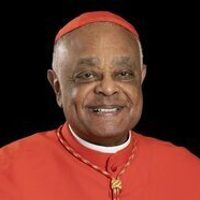I have already visited more than 40 of our parishes and schools during these first four months of my service to you as Archbishop of Washington. I still have more than 100 to go! I have found each encounter a grace-filled opportunity to pray with you, to chat with you, and to come to recognize your special characteristics. Small town parishes, large urban ones, those that use Spanish as their primary language of prayer and communication, and those with spirited gospel choirs are all a part of the fabric of this local Church. Each one of our communities is an important component of our Catholic identity.
This past weekend, I had a very poignant and wonderful visit with Saint Francis Parish for the Deaf. It was an important reminder for me of the presence and the blessings of this community of people who may need a little modification for their involvement in parish life, but who provide a double dose of warmth and goodness. Our Church must always keep in mind the special grace our brothers and sisters with disabilities bring to our parish families. The modest adjustments that we make to help them to participate in the community’s life are always well worth that effort.

These wonderful folks who may have the need for some modest accommodations in our parishes help us to see God’s hand in creation. They remind us of the gifts that so many of us may simply take for granted. They also witness the great strength and determination that people often have in rising above the challenges that we all might face in life.
Almost every parish currently has a box or step behind the ambo to help shorter adults or kids to reach the microphone and the lectern when they are readers at Mass. Handrails that are placed in strategic locations to assist those with mobility issues enter the sanctuary are now commonplace. A few parishes have pews that are designed to accommodate people who are seated in wheelchairs or who might need some extra space in church. Then there are the many communities who use people who sign for the hearing impaired. Almost every parish has designated parking places for those who need to be closer to the church entrance than most of us. Each of these gestures of welcome make life easier for a number of our folks to take part in parish worship and activities. They have become so routine that most of us do not even notice them. But those who need them do find them to be welcome conveniences that allow people to feel at home in parish life.
I recall when I was an auxiliary bishop in Chicago presiding at one of the Rites of Election at the beginning of Lent, witnessing a woman walking down the cathedral center aisle as she approached the altar with the assistance of her guide dog. She was entering the church as a catechumen who was visually impaired. Her presence was a stark reminder to me -- and I am sure to everyone at that ceremony -- that her physical handicap was not a barrier to belonging to the community of faith. In fact, she witnessed that the light of faith glowed brightly within her, and she illumined my heart, and many others as well, to remember that Christ in fact came to be the Light of our world, and we are all beckoned to remove those barriers that might hinder people from coming to Him and feeling welcome in the Church, which He established for all people.






